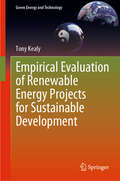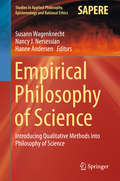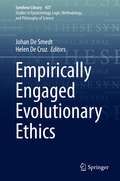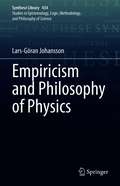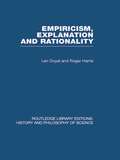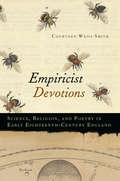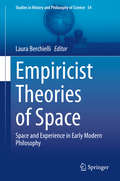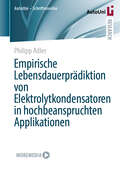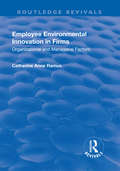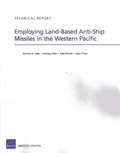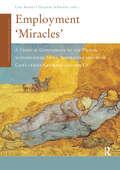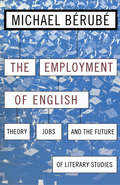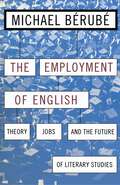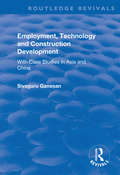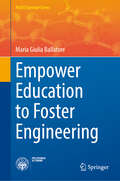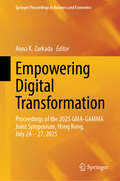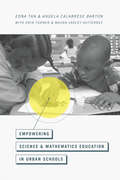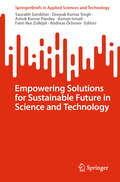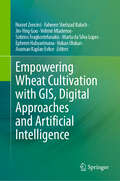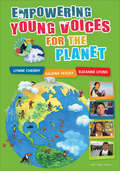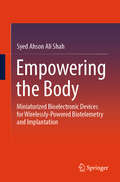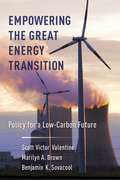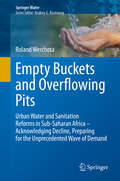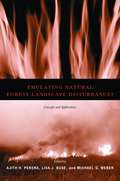- Table View
- List View
Empirical Evaluation of Renewable Energy Projects for Sustainable Development (Green Energy and Technology)
by Tony KealyThis book critically analyses renewable energy sources of electrical power/energy utilised to save money on the amount of electrical energy imported from the national electricity grid and help nations meet binding environmental goals. The main renewable energy sources analysed are wind turbine generators, hydroelectric plant, and solar PV systems. The book presents a robust evaluation framework that can be used in the renewable energy analysis process. One of the main findings is the identification of short-term variations associated mainly with wind turbine electrical generator power output signals. These short-term variations are negating the potential advantages of installing wind turbine electrical generators. One of the suggested methods to counteract the short-term variations is the use of energy storage. Without utility-sized energy storage, binding energy targets will be very difficult to achieve. The three main realms of sustainable development, namely environmental, economic, and human realms, are discussed throughout the book. The three realms are closely interlinked so a weakness identified in any one realm affects the overall sustainability of the (business, country, any organisation) development process.
Empirical Philosophy of Science
by Nancy J. Nersessian Susann Wagenknecht Hanne AndersenThe book examines the emerging approach of using qualitative methods, such as interviews and field observations, in the philosophy of science. Qualitative methods are gaining popularity among philosophers of science as more and more scholars are resorting to empirical work in their study of scientific practices. At the same time, the results produced through empirical work are quite different from those gained through the kind of introspective conceptual analysis more typical of philosophy. This volume explores the benefits and challenges of an empirical philosophy of science and addresses questions such as: What do philosophers gain from empirical work? How can empirical research help to develop philosophical concepts? How do we integrate philosophical frameworks and empirical research? What constraints do we accept when choosing an empirical approach? What constraints does a pronounced theoretical focus impose on empirical work? Nine experts discuss their thoughts and empirical results in the chapters of this book with the aim of providing readers with an answer to these questions.
Empirically Engaged Evolutionary Ethics (Synthese Library #437)
by Johan De Smedt Helen De CruzA growing body of evidence from the sciences suggests that our moral beliefs have an evolutionary basis. To explain how human morality evolved, some philosophers have called for the study of morality to be naturalized, i.e., to explain it in terms of natural causes by looking at its historical and biological origins. The present literature has focused on the link between evolution and moral realism: if our moral beliefs enhance fitness, does this mean they track moral truths? In spite of the growing empirical evidence, these discussions tend to remain high-level: the mere fact that morality has evolved is often deemed enough to decide questions in normative and meta-ethics. This volume starts from the assumption that the details about the evolution of morality do make a difference, and asks how. It presents original essays by authors from various disciplines, including philosophy, anthropology, developmental psychology, and primatology, who write in conversation with neuroscience, sociology, and cognitive psychology.
Empiricism and Philosophy of Physics (Synthese Library #434)
by Lars-Göran JohanssonThis book presents a thoroughly empiricist account of physics. By providing an overview of the development of empiricism from Ockham to van Fraassen the book lays the foundation for its own version of empiricism. Empiricism for the author consists of three ideas: nominalism, i.e. dismissing second order quantification as unnecessary, epistemological naturalism, and viewing classification of things in natural kinds as a human habit not in need for any justification.The book offers views on the realism-antirealism debate as well as on the individuation of theories as a thoroughly neglected aspect of underdetermination. The book next discusses a broad range of topics, including the predicates body, spatial distance and time interval, the ontology of electromagnetism, propensities, the measurement problem and other philosophical issues in quantum theory. Discussions about the direction of time and about string theory make up the final part of the book.
Empiricism, Explanation and Rationality: An Introduction to the Philosophy of the Social Sciences (Routledge Library Editions: History & Philosophy of Science)
by Len & Doyal & HarrisOriginally published in 1986. All students of social science must confront a number of important philosophical issues. This introduction to the philosophy of the social sciences provides coherent answers to questions about empiricism, explanation and rationality. It evaluates contemporary writings on the subject which can be as difficult as they are important to understand. Each chapter has an annotated bibliography to enable students to pursue the issues raised and to assess for themselves the arguments of the authors.
Empiricist Devotions: Science, Religion, and Poetry in Early Eighteenth-Century England
by Courtney Weiss SmithFeaturing a moment in late seventeenth- and early eighteenth-century England before the disciplinary divisions that we inherit today were established, Empiricist Devotions recovers a kind of empiricist thinking in which the techniques and emphases of science, religion, and literature combined and cooperated. This brand of empiricism was committed to particularized scrutiny and epistemological modesty. It was Protestant in its enabling premises and meditative practices. It earnestly affirmed that figurative language provided crucial tools for interpreting the divinely written world. Smith recovers this empiricism in Robert Boyle's analogies, Isaac Newton's metaphors, John Locke's narratives, Joseph Addison's personifications, Daniel Defoe's diction, John Gay's periphrases, and Alexander Pope's descriptive particulars. She thereby demonstrates that "literary" language played a key role in shaping and giving voice to the concerns of eighteenth-century science and religion alike. Empiricist Devotions combines intellectual history with close readings of a wide variety of texts, from sermons, devotional journals, and economic tracts to georgic poems, it-narratives, and microscopy treatises. This prizewinning book has important implications for our understanding of cultural and literary history, as scholars of the period's science have not fully appreciated figurative language's central role in empiricist thought, while scholars of its religion and literature have neglected the serious empiricist commitments motivating richly figurative devotional and poetic texts.Winner of the Walker Cowen Memorial Prize for an Outstanding Work of Scholarship in Eighteenth-Century Studies
Empiricist Theories of Space: Space and Experience in Early Modern Philosophy (Studies in History and Philosophy of Science #54)
by Laura BerchielliThis book explores the notions of space and extension of major early modern empiricist philosophers, especially Locke, Berkeley, Hume, and Condillac. While space is a central and challenging issue for early modern empiricists, literature on this topic is sparse. This collection shows the diversity and problematic unity of empiricist views of space. Despite their common attention to the content of sensorial experience and to the analytical method, empiricist theories of space vary widely both in the way of approaching the issue and in the result of their investigation. However, by recasting the questions and examining the conceptual shifts, we see the emergence of a programmatic core, common to what the authors discuss. The introductory chapter describes this variety and its common core. The other contributions provide more specific perspectives on the issue of space within the philosophical literature. This book offers a unique overview of the early modern understanding of these issues, of interest to historians of early modern philosophy, historians and philosophers of science, historians of ideas, and all readers who want to expand their knowledge of the empiricist tradition.
Empirische Lebensdauerprädiktion von Elektrolytkondensatoren in hochbeanspruchten Applikationen (AutoUni – Schriftenreihe #174)
by Philipp AdlerPhilipp Adler zeigt eine verbesserte Lebensdauerprädiktion von Elektrolytkondensatoren in Elektrofahrzeugen durch die Analyse temperaturbedingter Einflüsse mittels Multi-Domänen-Simulationen. Dies steigert die Systemzuverlässigkeit über 15 Jahre. Ein neu entwickeltes empirisches Modell erlaubt präzisere Alterungsprognosen. Langzeitversuche bestätigen, dass eine verbesserte thermische Anbindung mittels Wärmeleitpaste entscheidend die Lebensdauer erhöht. Die Ergebnisse fördern die Entwicklung langlebiger Elektrofahrzeuge und die EMV-Konformität.
Employee Environmental Innovation in Firms: Organizational and Managerial Factors
by Catherine Anne RamusThis title was first published in 2003. Testing policies promoted by current environmental management literature, this book puts forward a new conceptual model to identify which organizational and supervisory support factors can positively influence employees to promote environmental initiatives in businesses. The model uses employee knowledge of and belief in management commitment, testing thirteen environmental policies that influence employee eco-initiatives and six sets of organizational behaviour and supervisory support factors. The book features a thorough review of relevant organizational behaviour and corporate environmental management literature, describing what motivates adoption of company policies of sustainable development, factors motivating employees to implement innovation, and learning organization-type managerial behaviours that encourage employee actions. A survey questionnaire using behaviourally-anchored rating scales enables employees to assess the behaviours of their direct supervisors without the usual biases that occur in other opinion-based surveys. The survey highlights counter-intuitive results related to information sharing and environmental policies and the author proposes recommendations for more effective future policies.
Employing Land-Based Anti-Ship Missiles in the Western Pacific
by Terrence K. Kelly Anthony Atler Todd Nichols Lloyd ThrallLand-based anti-ship missiles (ASMs) feature prominently in the capabilities of many island nations in the Western Pacific, but the United States currently lacks such systems. This report illustrates the potential strategic advantages of the United States working with partners to build a coalition ASM capability, particularly in the event of a conflict with China, and includes an assessment of logistical challenges and positioning approaches.
Employment 'Miracles': A Critical Comparison of the Dutch, Scandinavian, Swiss, Australian and Irish Cases versus Germany and the US (Changing Welfare States)
by Uwe Becker Herman SchwartzWhy did some economies experience a boom in the 1990s? Employment ‘Miracles’ comparatively analyses select miracle economies. The contributors to the volume critically analyze how the small size and institutional structure of seven countries like the Netherlands, Denmark and Ireland accounted for their success and status as economic models. Comparisons with the American and German markets reveal how differing policies - liberal versus corporatist/social democratic - determine job growth and levels of income inequality and poverty. The book also stresses the explanatory relevance of lucky circumstances such as the housing price bubble. Employment ‘Miracles’ is an important resource for political scientists and economists in their study of employment development. A critical scrutiny of the ‘miracle economies’ of the 1990s, analysing the role of the relatively small size of the national economies in question, and of accidental external circumstances which contributed to favourable developments.
Employment of English: Theory, Jobs, and the Future of Literary Studies (Cultural Front #13)
by Michael BérubéWhat sorts of cultural criticism are teachers and scholars to produce, and how can that criticism be "employed" in the culture at large? In recent years, debates about the role and direction of English departments have mushroomed into a broader controversy over the public legitimacy of literary criticism. At first glance this might seem odd: few taxpayers and legislators care whether the nation's English professors are doing justice to the project of identifying the beautiful and the sublime. But in the context of the legitimation crisis in American higher education, the image of English departments has in fact played a major role in determining public attitudes toward colleges and college faculty. Similarly, the changing economic conditions of universities have prompted many English professors to rethink their relations to their "clients," asking how literary study can serve the American public. What sorts of cultural criticism are teachers and scholars to produce, and how can that criticism be "employed" in the culture at large? In The Employment of English, Michael Bérubé, one of our most eloquent and gifted critics, examines the cultural legitimacy of literary study. In witty, engaging prose, Bérubé asserts that we must situate these questions in a context in which nearly half of all college professors are part-time labor and in which English departments are torn between their traditional mission of defining movements of literary history and protocols of textual interpretation, and their newer tasks of interrogating wider systems of signification under rubrics like "gender," "hegemony," "rhetoric," "textuality" (including film and video), and "culture." Are these new roles a betrayal of the field's founding principles, in effect a short-sighted sell-out of the discipline? Do they represent little more that an attempt to shore up the status of--and student enrollments in--English? Or are they legitimate objects of literary study, in need of public support? Simultaneously investigating the economic and the intellectual ramifications of current debates, The Employment of English provides the clearest and most condensed account of this controversy to date.
Employment of English: Theory, Jobs, and the Future of Literary Studies (Cultural Front)
by Michael BérubéWhat sorts of cultural criticism are teachers and scholars to produce, and how can that criticism be "employed" in the culture at large? In recent years, debates about the role and direction of English departments have mushroomed into a broader controversy over the public legitimacy of literary criticism. At first glance this might seem odd: few taxpayers and legislators care whether the nation's English professors are doing justice to the project of identifying the beautiful and the sublime. But in the context of the legitimation crisis in American higher education, the image of English departments has in fact played a major role in determining public attitudes toward colleges and college faculty. Similarly, the changing economic conditions of universities have prompted many English professors to rethink their relations to their "clients," asking how literary study can serve the American public. What sorts of cultural criticism are teachers and scholars to produce, and how can that criticism be "employed" in the culture at large? In The Employment of English, Michael Bérubé, one of our most eloquent and gifted critics, examines the cultural legitimacy of literary study. In witty, engaging prose, Bérubé asserts that we must situate these questions in a context in which nearly half of all college professors are part-time labor and in which English departments are torn between their traditional mission of defining movements of literary history and protocols of textual interpretation, and their newer tasks of interrogating wider systems of signification under rubrics like "gender," "hegemony," "rhetoric," "textuality" (including film and video), and "culture." Are these new roles a betrayal of the field's founding principles, in effect a short-sighted sell-out of the discipline? Do they represent little more that an attempt to shore up the status of--and student enrollments in--English? Or are they legitimate objects of literary study, in need of public support? Simultaneously investigating the economic and the intellectual ramifications of current debates, The Employment of English provides the clearest and most condensed account of this controversy to date.
Employment, Technology and Construction Development: With Case Studies in Asia and China (Routledge Revivals)
by Sivaguru GanesanThis title was first published in 2000: An in depth analysis of employment and technology issues in the housing and construction industries of developing countries, in the context of globalization of economies and increased opportunities for advanced technology transfer. Supported by case studies from Asia including the misallocation of resources that led to the Asian crisis of 1997 and the experience of Shanghai in advanced technology transfer. Ganesan advances a number of strategies to achieve higher employment creation, a proper mix of resources and sustained growth.
Empower Education to Foster Engineering (PoliTO Springer Series)
by Maria Giulia BallatoreThis book highlights the pivotal role that engineering education researchers can play at technical universities. By delving into both theoretical and practical aspects, it showcases the transformative potential of integrating rigorous educational research into technical education. The book begins by outlining the current landscape of engineering education research and situates it within the unique context of the Italian educational system. This initial framework sets the stage for a detailed examination of the scope and limitations of the field. By understanding the experiences and challenges of both students and educators, the book bridges gaps and fosters an environment where educational practices are continuously improved and aligned with real-world demands. One of the key problems addressed is the disconnection often observed between educational theory and practical implementation. It provides actionable insights and recommendations that can help harmonize teaching methods with educational research findings. It offers strategies for enhancing student engagement, improving teaching methodologies, and ultimately producing graduates who are better equipped to meet the challenges of the engineering profession. This book serves as a valuable resource for educators, researchers, and policymakers dedicated to advancing the quality of engineering education, and by presenting a balanced analysis of students' and lecturers' perspectives, it offers a holistic view of the educational landscape and practical solutions for its improvement.
Empowering Digital Transformation: Proceedings of the 2025 GMA-GAMMA Joint Symposium, Hong Kong, July 24–27, 2025 (Springer Proceedings in Business and Economics)
by Anna K. ZarkadaThis book contains selected papers from the 2025 Greek Marketing Academy and the Global Alliance of Marketing and Management Associations Joint Symposium (GMA-GAMMA2025) held from July 24 to 27, 2025, in Hong Kong, China.It focuses on achieving a human-centered digital transformation by empowering people and integrating processes and platforms to foster sustainable prosperity for all. It challenges conventional thinking by offering novel conceptualizations, empirical evidence, and case studies from regions at various stages of digitalization and across different product, market, and industry contexts.The book aims to equip decision-makers and academics with the tools to navigate the increasingly blurred boundaries between humans and computers, businesses, institutions, and society, and the traditional, platform, attention, and experience economies. The chapters span operations, marketing, and management and bring together a variety of country context and industries undergoing digital transformation.
Empowering Science and Mathematics Education in Urban Schools
by Edna Tan Angela Calabrese Barton Erin E. Turner Maura Varley Gutiérrez.Math and science hold powerful places in contemporary society, setting the foundations for entry into some of the most robust and highest-paying industries. However, effective math and science education is not equally available to all students, with some of the poorest students--those who would benefit most--going egregiously underserved. This ongoing problem with education highlights one of the core causes of the widening class gap. While this educational inequality can be attributed to a number of economic and political causes, in Empowering Science and Mathematics Education in Urban Communities, Angela Calabrese Barton and Edna Tan demonstrate that it is augmented by a consistent failure to integrate student history, culture, and social needs into the core curriculum. They argue that teachers and schools should create hybrid third spaces--neither classroom nor home--in which underserved students can merge their personal worlds with those of math and science. A host of examples buttress this argument: schools where these spaces have been instituted now provide students not only an immediate motivation to engage the subjects most critical to their future livelihoods but also the broader math and science literacy necessary for robust societal engagement. A unique look at a frustratingly understudied subject, Empowering Science and Mathematics Education pushes beyond the idea of teaching for social justice and into larger questions of how and why students participate in math and science.
Empowering Solutions for Sustainable Future in Science and Technology (SpringerBriefs in Applied Sciences and Technology)
by Andreas Öchsner Azman Ismail Ashok Kumar Pandey Fatin Nur Zulkipli Deepak Kumar Singh Saurabh SambhavThis book, embarks the reader on a journey into the forefront of innovation where science, engineering, and technology converge to address the pressing challenges of our time. Through a captivating exploration of cutting-edge research, real-world case studies, and visionary insights, this book illuminates the dynamic forces shaping our collective journey towards a more sustainable and prosperous future. The book also explores how breakthroughs in science, engineering, and technology are reshaping our world for the better. This book is beneficial for research scholar, undergraduate and postgraduate students, or industry staff. The book inspires and empowers readers to become catalysts for positive transformation in our communities and beyond.
Empowering Wheat Cultivation with GIS, Digital Approaches and Artificial Intelligence
by Ephrem Habyarimana Nusret Zencirci Hakan Ulukan Faheem Shehzad Baloch Jin-Ying Gou Velimir Mladenov Sotirios Fragkostefanakis Marta da Silva Lopes Asuman Kaplan EvliceThe global population is projected to exceed 9 billion by 2050, leading to imminent food shortages not only for the current but also future generations. Anticipated increases in appetite coming 50 years will pose significant challenges to food production. This demand will exert additional pressure on agriculture for the escalating need for food. On one hand, research indicates a 60% increase in food production is necessary to accommodate the projected 9 billion people, on the other hand, a substantial portion of the population is grappling with various micronutrient deficiencies, such as iron, zinc, iodine, vitamin A, and folic acid, a condition referred to as "hidden hunger." Hence, it is imperative to exert substantial efforts towards developing improved cultivars under enhanced technological conditions. Concerns about climate change are anticipated to profoundly affect soil water availability, carbon storage, and crop yields. Droughts in the Mediterranean and Africa are expected to worsen during certain seasons. Each year, climate change leads to substantial losses in agricultural production, with a worsening scenario in the future. Wheat breeding has witnessed significant advancements with the wheat genomics, whole-genome sequencing, high-throughput phenotyping, genome-editing technologies, and marker-assisted breeding. These enable genome-based breeding to produce higher enough yielding by 2050. Speed breeding has a crucial role in the incorporation of new genes into breeding pipelines, facilitating the creation of innovative homozygous advanced lines, and accelerating the identification and functional characterization of new genes. Climate change and recent technological advancements necessitate efficient utilization of remote sensing, digital tools, and artificial intelligence approaches, have gained prominence in wheat agriculture. This book aims to encompass both past and upcoming research activities in this domain. It serves as a valuable resource for wheat breeders interested in leveraging modern data technologies in their research endeavours.
Empowering Young Voices for the Planet
by Lynne Cherry Ms Juliana Texley Suzanne E. LyonsBecause action is the best antidote to climate change! Use this manual to teach your students the science and reality of climate change, while empowering them to take action in their own communities. In this companion to the remarkable Young Voices for the Planet film series, you’ll find: Inspiring true stories of low- or no-cost youth-led projects that address a wide range of environmental issues Practical tips for inspiring students to develop projects relevant to their own communities, including planning, financing, safety, and liability Many creative and replicable ways to reduce CO2 emissions, as well as connections to the NGSS To view the films, visit www.youngvoicesonclimatechange.com.
Empowering the Body: Miniaturized Bioelectronic Devices for Wirelessly-Powered Biotelemetry and Implantation
by Syed Ahson ShahEmbark on a groundbreaking journey into the realm of miniaturized bioelectronic devices with "Empowering the Body." This captivating book delves into the world of wirelessly-powered biotelemetry and implantation, offering unparalleled insights into the future of healthcare monitoring. Discover the motivations driving the development of wireless implantable medical devices (WIMDs) and the challenges faced in their design. Unravel the mysteries behind biocompatibility, size miniaturization, patient safety, and impedance mismatches. Witness the innovative solutions that optimize performance and extend battery life, all while ensuring the utmost precision in therapy and treatment. Featuring state-of-the-art research, this book showcases cutting-edge advancements in miniaturized implantable antenna systems, ultra-small batteryless WIMDs, and deeply implanted stent antenna systems for endovascular aneurysm repair. Immerse yourself in a world of simulations, numerical analyses, and validation experiments, where the proposed systems are rigorously tested and proven to excel in heterogeneous human body tissue environments. "Empowering the Body" caters to a diverse audience of researchers, engineers, and medical professionals at the forefront of bioelectronic devices and wireless power transfer. Whether you're an expert in the field or a graduate student seeking knowledge, this book is your key to unlocking the potential of wireless healthcare solutions. Open the pages of this exceptional book and explore its unique approach, combining theoretical insights with practical applications. Gain a comprehensive understanding of how to overcome the limitations of current technologies, and be inspired by the possibilities that lie ahead. Don't miss your chance to be at the forefront of the biomedical revolution with "Empowering the Body."
Empowering the Great Energy Transition: Policy for a Low-Carbon Future
by Scott Valentine Benjamin Sovacool Marilyn BrownAt a time when climate-change deniers hold the reins of power in the United States and international greenhouse gas negotiations continue at a slow crawl, what options are available to cities, companies, and consumers around the world who seek a cleaner future? Scott Victor Valentine, Marilyn A. Brown, and Benjamin K. Sovacool explore developments and strategies that will help fast-track the transition to renewable energy. They provide an expert analysis of the achievable steps that citizens, organizational leaders, and policy makers can take to put their commitments to sustainability into practice.Empowering the Great Energy Transition examines trends that suggest a transition away from carbon-intensive energy sources is inevitable—there are too many forces for change at work to stop a shift to clean energy. Yet under the status quo, change will be too slow to avert the worst consequences of climate change. Humanity is on a path to incur avoidable social, environmental, and economic costs. Valentine, Brown, and Sovacool argue that new policies and business models are needed to surmount the hurdles separating the current consumption model from a sustainable energy future. Empowering the Great Energy Transition shows that with well-placed efforts, we can set humanity on a course that supports entrepreneurs and communities in mitigating the environmental harm caused by technologies whose time has come and gone.
Empty Breadbasket? The Coming Challenge to America's Food Supply and What We Can Do About It
by The Cornucopia Project of Rodale PressThe massive U.S. food supply which provides us with almost any food we want-at any time of year-is surprisingly fragile. Without a change in directions there will be a depletion of natural resources: soil, water, energy. This book is a result of the study conducted by the Cornucopia Project of Rodale Press to document the vulnerability, and suggest how consumers, farmers and food industry can improve.
Empty Buckets and Overflowing Pits: Urban Water and Sanitation Reforms in Sub-Saharan Africa – Acknowledging Decline, Preparing for the Unprecedented Wave of Demand (Springer Water)
by Roland WerchotaThis book provides a multi-level and multi-dimensional insight into urban water and sanitation development by analyzing sector reforms in Africa. With the recent events in mind - water shortages in Cape Town, widespread cholera in Haiti, mass-migration from low-income countries, etc. – it elaborates a pressing topic which is directly linked to the precarious living conditions of the urban poor in the developing countries. It is urgent to acknowledge the proposed findings and recommendations of the book which will help to improve the situation of potential refugees in their home countries with a realistic vision for the development of the most basic of all life supporting services.So many efforts to reverse the negative trend in water and sanitation development have failed or targets have been repeatedly missed by far without notable consequences for decision makers on different levels and institutions. It has unnecessarily consumed many young lives, contributed to keep billions in poverty until today and fostered discrimination of women. The knowledge gap and the confusion in the sector lined out in the book becomes evident when a national leader in a low-income country declares a state of emergency in urban water and sanitation while at the same time global monitoring publishes an access figure for urban water of over 90% for the same country. It is time to change this with an effective sector development concept for our partner countries and a more realistic discourse on global level.The book argues for a sweeping rethinking and combines extended local knowledge, lessons learned from history in advanced countries and thorough research on reforms in Francophone and Anglophone developing countries. This was possible because the writer was working in Sub-Saharan partner countries for almost 30 years as an integrated long term advisor in different sector institutions (ministry, regulator, financing basket and different sizes of utilities) and had the opportunity to cooperate closely with the main development partners.The reader has the opportunity to obtain a comprehensive understanding of how the sector works and sector institutions in low-income countries function and can discover the reasons behind success and failures of reforms. The book also covers issues which have a significant influence on urban water and sanitation development but are hardly the subject of discussions. It helps to make the shortcomings of the water and sanitation discourse more apparent and assist institutions to move beyond their present perceptions and agendas. All of this makes the book different from other literature about urban water and sanitation in the developing world.
Emulating Natural Forest Landscape Disturbances: Concepts and Applications (Forest Research Information Paper Ser. #No. 149)
by Lisa J. Buse Michael G. Weber Eds. Perera Ajith H.What is a natural forest disturbance? How well do we understand natural forest disturbances and how might we emulate them in forest management? What role does emulation play in forest management? Representing a range of geographic perspectives from across Canada and the United States, this book looks at the escalating public debate on the viability of natural disturbance emulation for sustaining forest landscapes from the perspective of policymakers, forestry professionals, academics, and conservationists. This book provides a scientific foundation for justifying the use of and a solid framework for examining the ambiguities inherent in emulating natural forest landscape disturbance. It acknowledges the divergent expectations that practitioners face and offers a balanced view of the promises and challenges associated with applying this emerging forest management paradigm.The first section examines foundational concepts, addressing questions of what emulation involves and what ecological reasoning substantiates it. These include a broad overview, a detailed review of emerging forest management paradigms and their global context, and an examination of the ecological premise for emulating natural disturbance. This section also explores the current understanding of natural disturbance regimes, including the two most prevalent in North America: fire and insects. The second section uses case studies from a wide geographical range to address the characterization of natural disturbances and the development of applied templates for their emulation through forest management. The emphasis on fire regimes in this section reflects the greater focus that has traditionally been placed on understanding and managing fire, compared with other forms of disturbance, and utilizes several viewpoints to address the lessons learned from historical disturbance patterns. Reflecting on current thinking in the field, immediate challenges, and potential directions, the final section moves deeper into the issues of practical applications by exploring the expectations for and feasibility of emulating natural disturbance through forest management.
